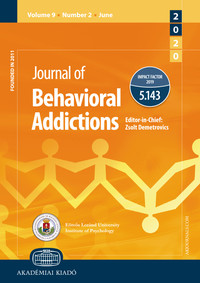The association between the Big Five personality traits and smartphone use disorder: A meta-analysis
The association between the Big Five personality traits and smartphone use disorder: A meta-analysis
Author(s): Davide Marengo, Cornelia Sindermann, Daniela Häckel, Michele Settanni, Jon D. Elhai, Christian MontagSubject(s): Behaviorism
Published by: Akadémiai Kiadó
Keywords: personality; Big Five traits; smartphone use disorder; meta-analysis; smartphone addiction; problematic smartphone use
Summary/Abstract: Background and aims. Personality is one of the most frequently investigated variables to shed light on the putatively addictive use of the smartphone. By investigating associations between personality and individual differences in addictive smartphone use, researchers aim to understand if some personality traits predispose technology users to develop addictive behaviors. Here, based on existing empirical literature, we aimed at determining the strength of associations between Big Five personality traits and smartphone use disorder (SmUD) by a meta-analytic approach. Method. For each Big Five personality trait, we performed a meta-analysis of correlations representing their association with SmUD. We also investigated possible publication bias and the moderating effects of age, gender, nationality, length of personality assessments, and time of publication. Results. We found n = 26 eligible studies. In line with both the Interaction of Person-Affect-Cognition-Execution (I-PACE) model and the framework on problematic mobile-phone use by Billieux, we observed a positive association between Neuroticism and SmUD (r = 0.25), while the association between Extraversion and SmUD was not significant. Partially in line with the aforementioned theoretical frameworks, Conscientiousness was negatively associated with SmUD (r = −0.16). Remaining traits showed smaller associations. No significant publication bias emerged. Moderator analyses showed that time of publication moderated the link between Conscientiousness and SmUD. Moreover, Agreeableness and Conscientiousness showed a heightened inverse association with SmUD among older samples. Conclusions. The present meta-analysis provides robust empirical evidence that Big Five personality traits can help to understand individual differences in SmUD, supporting the usefulness of their assessment when planning and targeting interventions aimed at at-risk individuals.
Journal: Journal of Behavioral Addictions
- Issue Year: 9/2020
- Issue No: 3
- Page Range: 534-550
- Page Count: 17
- Language: English

